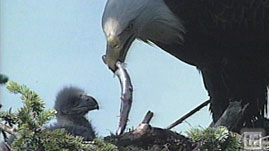Teachers' Domain - Digital Media for the Classroom and Professional Development
User: Preview

Source: KTOO
This video adapted from KTOO examines a virus outbreak that affected the Pacific herring population in Alaska's Prince William Sound in 1999. Because the herring play a very important part in both the local economy and the subsistence lifestyle practiced by the area's Alaska Native people, community members and scientists have sought to identify the cause of the virus. One hypothesis suggests that oil from the 1989 Exxon Valdez tanker spill, though not the direct cause of the virus, is a stressor that allowed the virus to take hold in the fish 10 years after the spill.
Several years after the 1989 Exxon Valdez tanker spill, the ecosystem in Prince William Sound appeared to have largely recovered. But the population of at least one important species had collapsed, failing to recover to this day. Pacific herring are central to the Sound's marine food web, sustaining marine mammals, birds, invertebrates, and other fish. Prior to the Valdez spill, Pacific herring were fished commercially and at subsistence levels for food and bait. Since the herring fishery collapsed, the local communities and regional economies that depended on fishing have suffered. Many parties have sought to understand what happened.
Herring first sharply declined in Prince William Sound in 1993, four years after the oil spill. This year was the stage in the herring life cycle when fish that hatched in the wake of the spill were just reaching their spawning age. Although the population had been increasing prior to 1989, with record harvests reported just before the spill, in 1993, less than one-fourth the number of expected adults returned to spawn.
Many specific reasons for the population collapse and failure to recover remain unknown. One hypothesis has been proposed by a group of virologists (virus specialists) and fisheries biologists who examined the herring. They found ulcers and other lesions on the bodies of fish, suggesting a major epidemic had set in. After exposing herring to various concentrations of oil in water, and after conducting a parallel study in another body of water that had not been exposed to oil, they found a correlation between the amount of oil exposure and the likelihood of the herring contracting the disease. While most fish did not die from the virus, the sub-lethal effects were negatively affecting reproductive success.
Because ecosystems are complex, and because Prince William Sound was not thoroughly studied prior to the spill, there is insufficient evidence to demonstrate an unequivocal connection between the oil and the virus. In fact, the spill could have simply exacerbated declines already occurring. Nevertheless, it is possible that the oil was a stressor that allowed the virus to express itself, in perhaps the same way that we become more susceptible to a cold-causing virus when our immune system is suppressed. The oil might have made the fish more susceptible to infection and less able to fight it.
As Craig Matkin of the North Gulf Oceanic Society states in the video, the Prince William Sound ecosystem will never return to pre-spill conditions. Natural factors will eventually readjust the abundance of marine life.
 Loading Standards
Loading Standards Teachers' Domain is proud to be a Pathways portal to the National Science Digital Library.
Teachers' Domain is proud to be a Pathways portal to the National Science Digital Library.
